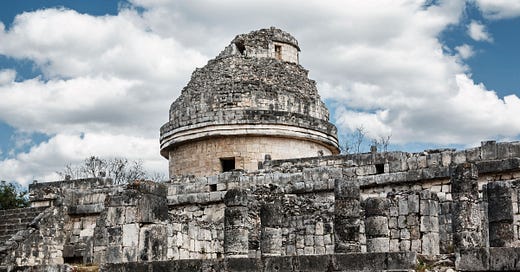Saw a headline promising ancient wisdom from the Mayans. Got another sermon on ‘resilient cities’ instead. The post—“What Mayan Ruins Are Now Revealing About A Lost And Powerful Civilization”—like most polished takes on past collapses, it delivers some facts while missing the conclusion entirely.
The article lays out a compelling narrative: Mayapan, the last great capital of the Maya, was undone by a perfect storm of drought, crop failure, political conflict, and resource scarcity. There was a “war over water,” a slow unraveling of trade routes, and eventually, civil war. It’s the kind of story that makes climate scientists nod and liberal policymakers urge us to build smarter, more resilient cities.
But here’s where it gets dangerous: the article claims the lesson is about adaptation.
“The Mayan experience serves as a stark warning to modern societies: we must adapt to these changes and address climate issues before they force us into similar conflicts and struggles for survival. The decline of Mayapan wasn’t just a tale of ancient misfortune; it was a lesson in how environmental changes can fuel political turmoil, economic instability, and social collapse.”
It tells us we must "future-proof" our civilization—build more sustainable infrastructure, develop smarter policies, and strengthen our resilience to climate change.
Wrong Variable, Wrong Lesson: A Civilization Built to Collapse
Let’s not kid ourselves with this sanitized tale of Mayan collapse repackaged as a cautionary climate parable. Yes, the drought was real. Yes, the crops failed. And yes, civil conflict tore Mayapan apart. But the real story, the deeper truth, isn't that they weren't "resilient" enough. It's that cities—especially hierarchical, centralized civilizations—are inherently unsustainable. The Maya's downfall wasn’t a failure to adapt to climate change; it was the inevitable crash of a system that put power and complexity above ecological harmony and communal autonomy.
The article wrings its hands and pleads that we must "adapt our civilization" to survive climate change, as if the solution lies in retrofitting the very machine that's driving us off the cliff. It's the same logic of empire repackaged in green jargon—sustainable development, resilient infrastructure, climate-smart cities. But cities aren't just the victims of environmental collapse—they're the engines of it. Cities demand extraction, they require importation, they generate waste, and they enforce violence to secure their lifelines. This isn’t a glitch in the system—it is the system.
What the article fails to see—what most modern minds refuse to even imagine—is that the Mayan people didn’t disappear. They walked away. They left the collapsing city-states and returned to the forests, to the villages, to the sustainable, decentralized ways of life their ancestors had practiced for thousands of years. That isn’t failure. That’s wisdom.
If there’s a lesson here, it’s not to fortify our metropolises against the next big drought. It’s to abandon the false promise of civilization itself. It’s to recognize that the Mayan "collapse" was really a de-urbanization—a liberation from empire. They returned to what worked: smaller communities, local subsistence, interdependence with land rather than domination over it.
This isn’t about making civilization more "climate ready." It’s about rejecting civilization as the death cult it is. Preparing for collapse doesn’t mean hardening the empire’s walls. It means remembering how to live without the empire altogether. The Maya knew that. Maybe we can still remember it, too.
So What Now? Walking Away Isn’t Giving Up—It’s Starting Over
If civilization is the problem, then leaving it behind—mentally, physically, spiritually—is the first act of healing. And no, that doesn’t mean we all need to disappear into the forest tomorrow (though some of us might). It means we start reclaiming our lives from the machine now, wherever we are, however we can.
Start with disobedience. Stop believing the story that progress means buying the latest tech, climbing the career ladder, or living in a concrete hive of noise and neon. Quit trying to "win" a rigged game that only ends in collapse.
Reclaim relationship. With land. With food. With water. Grow something. Anything. Connect with the soil. Learn to harvest rain. Cook from scratch. Forage. Hunt. Build a compost pile. Make friends with a tree. These aren’t hobbies—they are acts of resistance. They are how you start becoming indigenous to place again.
Rebuild community. Not in the fake, suburban sense, but in the real, mutual-aid, shared-resources, interdependence sense. Find your people. Share tools. Trade skills. Create tiny, resilient networks. Every strong village begins with trust, not tech.
Rethink scale. Civilization wants big—big cities, big money, big systems. Shrink it all. Decentralize. Localize. Simplify. Complexity is the enemy of resilience. A small garden and a tight-knit circle will feed you better than a global supply chain ever will.
And above all: Listen to the land. Stop seeing nature as scenery. Listen like your life depends on it—because it does. Let the birds and the wind and the weeds teach you what no policy paper ever will. Let them show you how to live again.
We don't need a reformed civilization. We need a post-civilized life. We need to stop being good citizens of Empire and start becoming feral human beings again—grounded, wild, sacred. That doesn’t mean chaos. It means real order. Earth order. The only kind that lasts.
The Maya remembered. So must we.






Super Justin, thanks, I love the term post civilised life.
Love this post! Thank you Justin.